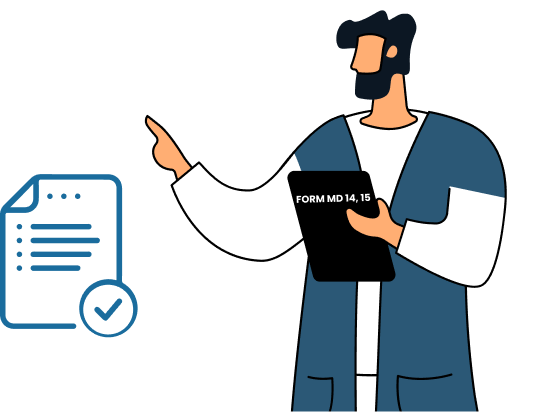EPR authorization certificate from CPCB (for E-waste) in India

CliniExperts handles it all – from completing Form 1 and other necessary documents to ensuring smooth approvals. We specialize in license applications, KYC documents, and annual returns. Our expertise minimizes disruptions and guides you toward responsible e-waste management. Get compliant, avoid penalties, and focus on your core business. Contact us today!
EPR authorization certificate from CPCB (for E-waste) – Overview
Who Can Apply?
Any entity involved in the lifecycle of electrical and electronic equipment (EEE) can apply for an e-waste license. This includes :-
- Manufacturers: Companies that produce EEE
- Recyclers: Businesses that process e-waste to recover valuable materials (For precious, semi-precious metals and rare earth elements).
- Producers: Entities that offer EEE for sale, including importers and brand owners.
- Refurbishers: Companies that restore used EEE to working condition.
Extended Producer Responsibility (EPR) mandates that manufacturers of electronics listed in Schedule I must meet recycling targets specified in Schedules III and IV. This obligation requires collaboration with certified e-waste recyclers to ensure environmentally sound management of electronic waste. A total of 106 electronic items across seven categories fall under this regulatory framework.

How To Apply?
The Applicant must follow the following process:
-

1. Registration: Apply online on the CPCB E-waste ERP Portal (https://eprewastecpcb.in/).
-

2. Document Submission: Submit required documents (see "Documents" section).
-

3. Approval: CPCB will review your application within 60 working days.
-

4. Post-Approval: After approval, you need to:
- File quarterly and annual returns.
- Meet recycling targets.

Validity
To ensure regulatory compliance and effective e-waste management, licenses issued under the E-Waste (Management) Rules are valid for a period of 5 years.
Fee Involved
The Indian government has outlined a fee structure for e-waste management based on annual recycling volumes. Such as:-- Entities recycling less than 50 metric tons of e-waste per year will be charged Rs. 2500.
- For those recycling between 50 and 100 metric tons, the fee is Rs. 7500
- A fee of Rs. 1,50,000 applies to entities handling 100 to 1000 metric tons.
- The fee escalates to Rs. 10,00,000 for those recycling between 1000 and 5000 metric tons, and
- Rs. 15,00,000 for those exceeding 5000 metric tons annually.
Important Documents

- Company Identification: Company Knows Your Customer (KYC) details (GST, PAN card, IEC no. (Importer-Exporter Code), e-mail, and other contact details, etc.).
- Regulatory Approvals: Consent to establishment from the concerned State Pollution Control Board (SPCB).
- Project Layout: Detailed layout plan of the project.
- Production Capacity: Proof of plant and machinery capacity issued by the district industries center or relevant authority.
- Environmental Fees: Consent fees payable to the board of directors under the Water and Air Acts.
- Director/Partner Information: Know Your Customer (KYC) details of directors or partners (email, telephone, PAN no. Aadhar Card).
- Water Resource Approval: Groundwater clearance obtained from the competent authority [Copy of CTE(Consent to Establish) & CTO(Consent to Operate) under Water and Air Act issued by concerned SPCB/PCC (State Pollution Control Committees)].
- Sewage Treatment Plan: Detailed proposal for the sewage treatment plant, including design characteristics, treatment methods, and disposal plans.
- Business Registration: Certificate of registration from the district industries center or other relevant government agencies.
- Financial Information: Auditor's certificate with a breakdown of proposed fixed assets, certified by a chartered accountant.
- Self-Declaration: A self-declaration on authentic data submission is required. The declaration should be on company letterhead, signed by an authorized person, and include the company seal.
Timeline to get from Central Drugs Standard Control Organisation
60
DaysEssential Tips
- Accurate Weight Determination: Precisely calculating the total weight of the product is crucial for the application process.
- Recycler Partnership: Collaborating with a reputable recycler or seeking expert guidance (CliniExperts) is essential for efficient annual return management.
- Timely Returns: Adhering to submission deadlines for returns is paramount to maintain compliance.
- Technical Glitches: The new government portal may experience technical issues, potentially hindering the application and submission process.
Expert Advise
To navigate the e-waste license application process successfully, an expert recommends the following:-
- Pay fees on time
- Don’t miss to upload any documents while registering.
- Thorough Understanding: Understand what the government says about e-waste.
- Strategic Partnerships: Collaborate with certified recyclers to meet recycling targets and streamline the process.
- Timely Action: Adhere to all deadlines and requirements to avoid penalties.
By following these recommendations, applicants can increase their chances of obtaining the e-waste license and maintaining compliance.
Related Services
Permission to Manufacture Class A-B Medical Devices in India - Form MD 3 & MD 5
Importer | Regulatory Body: Medical Device
The application for manufacturing, sale or distribution of any medical device includes a tedious list of processes and forms CliniExperts team consists of experts working in the same domain with practical experience and knowledge of the governing rules.
Permission to Manufacture Class C & D Medical Devices in India - Form MD 7 & MD 9
Importer | Regulatory Body: Medical Device
CliniExperts can functions as authorized agent in India. It has a firm position in the Indian Healthcare market, and holds a valid Drug Wholesale License.
Permission for Loan License to Manufacture Class A - B Medical Devices in India - Form MD 4 & MD 6
Importer | Regulatory Body: Medical Device
Achieve the success that your medical business deserves. Permission for medical device loan license to manufacture class A - B medical devices helps you to boost the production and attain new heights.
Frequently Asked Questions
Who needs an e-waste license?
Anyone involved in manufacturing, selling, importing, refurbishing, dismantling, or recycling electronic products needs an e-waste license. This includes manufacturers, importers, and resellers.

How long does it take to get an e-waste license?
The approval process typically takes around 60 working days. However, this timeframe may vary depending on the completeness of your application and other factors.

What are the penalties for not having an e-waste license?
Operating without a valid e-waste license can result in penalties imposed by the regulatory authorities. These penalties can include fines and other legal actions.

Which documents are required for the e-waste license?
Application Form and Approval Form.

Who is the issuing authority for the e-waste license?

What are the government fees for e-waste management based on annual recycling targets?
The fees range from Rs. 2500 for those recycling less than 50 MT to Rs. 15,00,000 for those recycling over 5000 MT annually.

